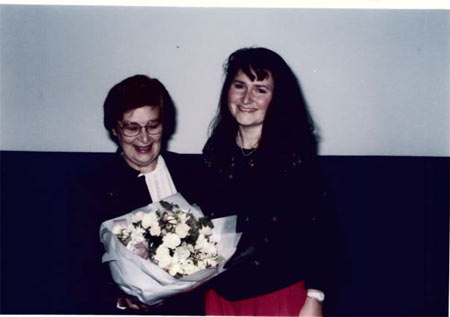
Date and place of birth
27th of January, 1928, Hawthorn, Melbourne
Died
13/10/2019
Education
- The University of Melbourne
- Alfred Hospital Clinical School
Academic qualifications
- 1951 - MBBS Melbourne
- 1961 - DCH London
- 1962 - MRCP London
- 1975 - MRACP
- 1978 - FRACP
Positions held
The Royal Children's Hospital
- 1954 - 1958 Resident Medical Officers/Medical Registrar/Research Assistant Clinical Research Unit/Assistant to Medical and Psychiatric Outpatients
- 1962 - 1964 Senior Assistant to Medical Outpatients
- 1967 - 1973 Senior Assistant Clinical Haematologist
- 1971 - 1974 Research Fellow, the RCH Research Foundation
- 1973 - 1982 Associate Clinical Haematologist
- 1982 - 1991 Clinical Haematologist
Queen Victoria Memorial Hospital and Queen Vitoria Medical Centre
- 1951 - 1954 Resident Medical Officer
- 1958 - 1959 Medical Registrar/Neonatal Registrar
- 1962 - 1964 Honorary Junior Paediatrician
- 1967 - 1976 Senior Paediatrician
- 1971 - 1979 Paediatrician Physician, Haematology Clinic
- 1979 - 1987 Specialist Paediatric Haematologist
Monash Medical Centre
- 1987 - 1991 Clinical Haematologist
- Head - Paediatric Haematology Clinic
- Head - Thalassaemia Service
Central Middlesex Hospital, London
- 1960 - 1961 Paediatric Registrar
Queen Elizabeth Hospital for Mothers and Babies
- 1962 - 1964 Medical Officer/Lecturer
Medical Department, Hong Kong
- 1964 - 1967 Medical Officer - infectious diseases/tuberculosis/neonatal paediatrics/paediatric haematology
Clinical interests
- Haematology
- Blood group incompatibility - changes in management
- G6PD deficiency
- Acute childhood leukaemia
- Thalassaemia
- Childhood cancer
- Management of children with chronic disease requiring treatment for long periods of time/helping them to transition into adult care
- Genetic counselling for patients, parents and partner for whom thalassaemia is a problem
- Community education of thalassaemia and related disorders
Research interests
Sydenham's Chorea - in depth investigation of 20 consecutive patients to determine the importance of streptococcal infection and psychological disturbance in these children. Chorea is best regarded as a syndrome in which serious psychological disturbances are almost always present in the child at home, in which streptococcal infection frequently occurs and in which rheumatic fever often develops.
Treatment of acute childhood leukaemia.
Treatment of childhood cancers.
Management of thalassaemia and sickle cell disease.
Career achievements
Rae played an integral role in the establishment of the Thalassaemia Society of Victoria in 1975. The Society was instrumental in improving community knowledge of thalassaemia and related conditions. The Society continues today as Thalassaemia Australia as all the states in Australia are now involved.
Rae also played a key role in the establishment of a thalassaemia services for adult patients with thalassaemia and related conditions - first at Queen Victoria Medical Centre in 1987 and later at Monash Medical Centre in 1990. The service formed part of a comprehensive and integrated service providing care for all patients with thalassaemia and related conditions, including genetic testing, counselling and antenatal diagnosis and social work assistance.
An achievement Rae recalled with pride was to have had patients with transfusion dependent thalassaemia leading normal lives with survival into their sixties.
Career highlights
Rae performed the first exchange transfusion on a jaundiced neonate at The Royal Children's Hospital. The baby was under the care of Dr. Elizabeth Turner.
A career highlight Rae remembered well was attending a discussion by the Haematology and Oncology team in which they discussed the possibility of using the word "cure" for long term survivors of acute lymphoblastic leukaemia.
Rae saw the first pregnancy in a patient with transfusion-dependent thalassaemia with the successful delivery of a healthy baby at term.
Rae joyfully remembered hearing an older transfusion dependent patient asking his treating doctor ""What treatment in aged-care can we expect?".
In 1964 Rae was mobilised into the workforce of the Hong Kong Medical Department as a matter of some urgency because of a cholera outbreak. She started working at the Lai Chi Kok Infectious Diseases Hospital in Kowloon. This was at the time when famine was rife in China and many refugees had come over the border into Hong Kong. They were living in very crowded conditions. Some of them were living in make-shift huts on the hills and could be washed away by floods during the typhoons, others were crowded on boats around the shore. In the hospital they treated many children with diphtheria, poliomyelitis and adults with typhoid, dysentery and tetanus. Patients with tuberculosis attended Outpatient clinics to receive their treatment on a daily basis. Rae recalled her medical school text books coming alive during her time working in Hong Hong.